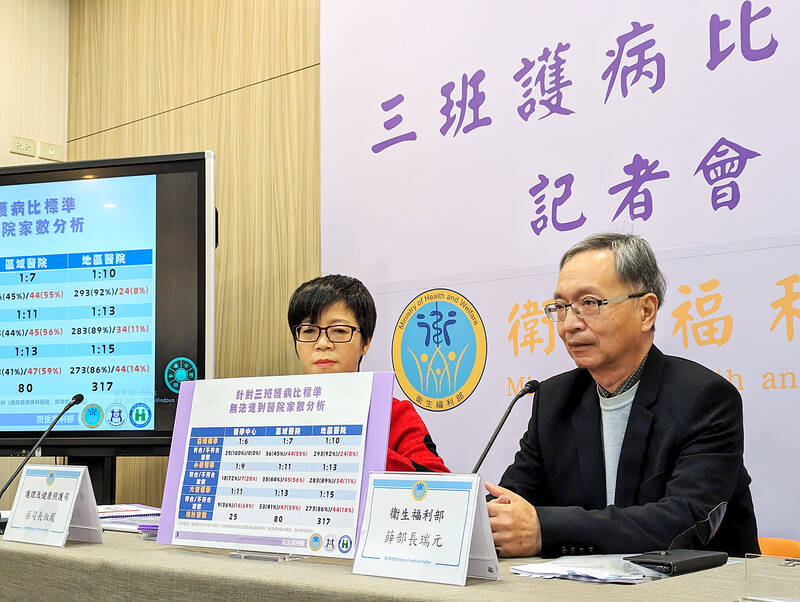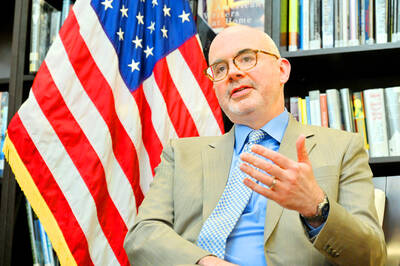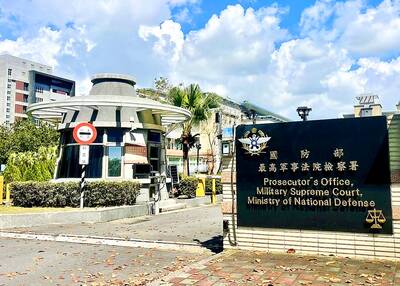New standards on personnel assignment ratios in compliance with new hospital rotation schedules and cash rewards to incentivize staff to be more willing to work night and graveyard shifts are to take effect on March 1, the Ministry of Health and Welfare said yesterday.
It is hoped the standards could balance the ratio of medical personnel to patients in a manner that reduces stress for personnel, while addressing the issue of a short-staffed medical industry, Minister of Health and Welfare Hsueh Jui-yuan (薛瑞元) said at a news conference, adding that the version introduced referenced proposals submitted by the Taiwan Union of Nurses Association.
The ministry is setting aside a special budget of NT$4 billion (US$127.8 million) for monetary incentives for those working night shifts, he said.

Photo: Wu Liang-yi, Taipei Times
Night shift personnel would receive NT$400 to NT$600 per shift, while workers on graveyard shifts would receive NT$600 to NT$1,000 per shift, the ministry said, adding that the cash rewards would be paid out monthly by the National Health Insurance Administration.
If a nurse works 21 days a month, those willing to work night and graveyard shifts would receive an additional NT$6,400 to NT$21,000 per month, the ministry said.
The new shift standards are meant to encourage workers to work night and graveyard shifts, Hsueh said, adding that the ministry is not planning to draft a law on the issue.
In response, the Taiwan Union of Nurses Association yesterday said it was glad the government had taken note of the issue and was introducing measures to resolve it.
However, it is regrettable that the government has ignored the top four demands of the association and the medical industry — that all medical personnel across all shifts should receive cash awards, to prioritize personnel at medical facilities for cash awards and for hospitals to receive the cash awards and pay them to medical personnel, the association said.
The standards as proposed would only leave workers on day shifts feeling that they have been left out, it said, adding that the amount of cash should not be based on the level of a medical facility.
It said it was concerned the policy would create more inequality in shift rotations and encourage medical personnel to work for higher-level medical facilities.
The ministry separates medical facilities into four categories — medical centers, regional hospitals, local hospitals and clinics.

NATIONAL SECURITY: The Chinese influencer shared multiple videos on social media in which she claimed Taiwan is a part of China and supported its annexation Freedom of speech does not allow comments by Chinese residents in Taiwan that compromise national security or social stability, the nation’s top officials said yesterday, after the National Immigration Agency (NIA) revoked the residency permit of a Chinese influencer who published videos advocating China annexing Taiwan by force. Taiwan welcomes all foreigners to settle here and make families so long as they “love the land and people of Taiwan,” Premier Cho Jung-tai (卓榮泰) told lawmakers during a plenary session at the Legislative Yuan in Taipei. The public power of the government must be asserted when necessary and the Ministry of

Proposed amendments would forbid the use of all personal electronic devices during school hours in high schools and below, starting from the next school year in August, the Ministry of Education said on Monday. The Regulations on the Use of Mobile Devices at Educational Facilities up to High Schools (高級中等以下學校校園行動載具使用原則) state that mobile devices — defined as mobile phones, laptops, tablets, smartwatches or other wearables — should be turned off at school. The changes would stipulate that use of such devices during class is forbidden, and the devices should be handed to a teacher or the school for safekeeping. The amendments also say

CONSISTENT COMMITMENT: The American Institute in Taiwan director said that the US would expand investment and trade relationships to make both nations more prosperous The US would not abandon its commitment to Taiwan, and would make Taiwan safer, stronger and more prosperous, American Institute in Taiwan Director Raymond Greene said. “The US’ commitment to Taiwan has been consistent over many administrations and over many years, and we will not abandon our commitment to Taiwan, including our opposition to any attempt to use force or coercion to change Taiwan’s status,” he said in an exclusive interview with the Liberty Times (the sister newspaper of the Taipei Times) on Friday last week, which was published in the Chinese-language newspaper yesterday. The US would double down on its efforts

SECURITY: President William Lai has announced plans to restore the military court system that was disbanded in 2013 to address a surge in Chinese infiltration efforts Taiwan plans to reinstate military judges to hear Chinese espionage cases and other offenses involving Taiwanese service members, President William Lai (賴清德) said yesterday. There would be a review and legal amendments “to reinstate the military trial system,” he told reporters after a national security meeting. “Military judges will return to the front line,” Lai said. Military judges would work “alongside prosecutorial and judicial agencies to handle criminal cases involving active-duty military personnel accused of treason, aiding the enemy, leaking classified information, dereliction of duty, insubordination and other military offenses,” he said. The number of people prosecuted for spying for Beijing has risen sharply,